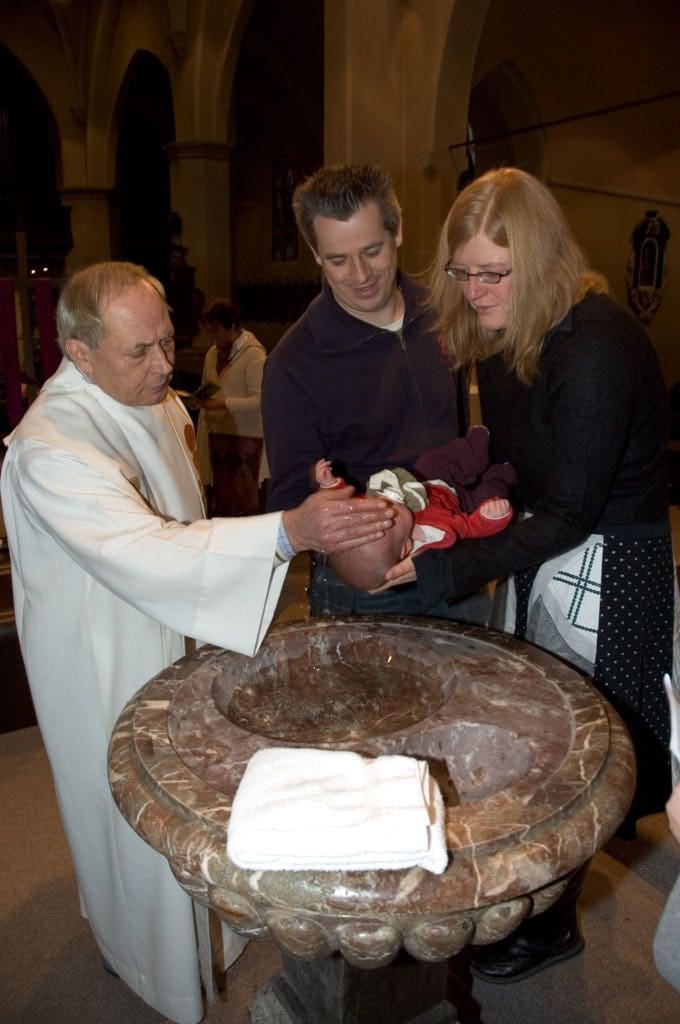An interview with Italian scholar Francesco Arduini. He favors baptism at an adult age but defends the right of other Christians to administer it to infants.
by Marco Respinti


“The Christian practice of baptizing minor or even infants, or paedo-baptism, is wrong.” In one version or another, this idea re-appears from time to time among scholarly circles and in the public discourse. The justifications given are mainly two, each of them in turn expressed in various forms. But one reason is typical of some Christian denominations, while the other is popular among secular commentators. The difference is significant, as well as its consequences.
In Christianity, baptism is the sacrament of initiation to Christian life, thus fundamental and foundational. It introduces a person to Christian life by the grace of God. While not all Christian denominations perform baptism, most do. But Christian denominations and movements have different ideas regarding at what age baptism should be administered. Those that favor and administer baptism to infants, or paedo-baptism, for example the Catholics, justify it by pointing at the educational responsibility that parents have over their children. Stressing the importance of granting children divine grace as early as possible in their life, they underline that, in a sacrament, it is God who acts through grace beyond human comprehension. God’s acts are ultimately always beyond the comprehension of human beings. There is, though, a human acceptance that parents have the authority (both for natural reason and according to Catholic theology) to give on behalf of their children.
For similarly important reasons, but concluding in the opposite direction, other Christian denominations maintain that, being baptism such an important assent and consent of faith to God’s grace, it should be administered only to people who are capable to freely and fully manifest their own faith. Since calling it “baptism at an adult age” would raise other problems over the definition of what an adult is and at what age a person becomes an adult, its proposers call it “credo-baptism,” or “baptism of believers.”
But not all critics of paedo-baptism are Christians. Many hold a secular approach to the whole matter, and formulate the argument quite differently, affirming that only once grown up can persons freely decide for themselves over baptism. While they are in turn accused by their Christian opponents who support paedo-baptism not only of misunderstanding theology and doctrine, but also of undermining the concept of natural family, many of them are really critics of baptism as such. They in fact tend to use the Christian controversy over paedo-baptism vs. credo-baptism as an excuse to delay the administration of baptism in one’s life as much as possible, pushing it possibly to an age in which, today, many people do not care about faith anymore and forget about baptism.
To criticize baptism as such, aiming at propagating a deeply secular worldview in society as much as possible, secular critics that make an instrumental use of this Christian controversy find it easier to focus on paedo-baptism. They denounce paedo-baptism as a constriction, and even an act of violence performed by parents on children, with the complicity of the Christian community they live in—and the denomination the community they live in belongs to. This is why even some Christian proponents of credo-baptism who are critical of paedo-baptism distance themselves from secular critics, denouncing their attempts to regulate baptism as an open attack on religious liberty, especially when the state is involved.
Italian scholar Francesco Arduini is one of the Jehovah’s Witnesses and holds a degree in Biblical Science; he has studied the history of the first Christian communities for decades. Focusing specifically on baptismal rites and practices, he has published many articles on the subject, both in academic journals and in popular magazines. It is not a mystery that his new scholarly book, “The Infant Baptism: The Case for a Pandemic Origin,” favors credo-baptism, but it also documents that paedo-baptism was practiced by early Christians, tracing a possible literary testimonial to the times of Irenaeus of Lyon (ca. 130– ca. 202), in the year 180.


Francesco Arduini, don’t you think that secular criticism entirely misses the point on what Christian baptism is, be it paedo-baptism or credo-baptism?
Yes, I do. Secular critics, while citing Canon Law codes and Catechism articles to support their arguments, on one hand have difficulty in grasping the specifically religious aspect of the Christian sacraments and on the other hand seem to completely ignore the difference between orthodoxy and orthopraxy. They point to extreme consequences (even of economic nature) that today rarely happen in the lives of those that have been baptized as infants.
What is the most dangerous aspect of secular criticism of paedo-baptism?
Law grants natural authority over children to parents. Parents have the duty to raise and educate their children according to parental sensibility even in the religious sphere. Secular critics, especially atheistic and anti-religious critics, seem to use the paedo-baptism argument as a crowbar to unhinge the traditional values of Christian culture. Since baptism is the foundation of every Christian church, any secular attempt to undermine baptismal practice (whatever form one gives to it) constitutes an attempt to demolish ecclesial values and institutions.


Isn’t it dangerous to leave to states (all states, both religious and secular) the right to rule on baptism and decide at what age it should be administered?
Of course it is. Thinking that secular legislation should intervene by determining at what age Christian baptism should take place is very dangerous. It would be a direct attack on religious liberty, which is protected as a fundamental aspect of any modern democratic state.
It starts with regulating baptism and ends no one knows where, right?
Exactly. In fact, we might ask: which is the right of a state to legislate today on the baptismal age rather than tomorrow, say, on the practice of confession? Or why should baptism be regulated by “Caesar” and Eucharist should not? Do we want states to dictate the conditions of access to the sacrament of the Eucharist too? Let me give another example: in Roman Catholicism, priesthood is reserved to males. Both doctrine and magisterium are quite clear on that. Other Christian denominations disagree, but in Roman Catholicism it cannot be changed, and of course it does not derive from any chauvinistic or male-supremacy reason. This is a matter for Christians, though. If we allow states to decide on baptism, is it so far-fetched to think that perhaps one day legislatures might even impose female priesthood to churches by law, or any other rite contrary to a specific confessional exegesis?
You, as a Jehovah’s Witness, disagree with paedo-baptism at a theological level but defend the right of other Christians to believe in it and perform it. Why?
The value of a few famous words, often but wrongly attributed to French philosopher Voltaire (François-Marie Arouet, 1694–1778), remains high: “I disapprove of what you say, but I will defend to the death your right to say it”. In our case, the “right to say it” and “the right to perform it” are both at stake. It is a matter of freedom. I, in fact, do wish for my disagreements with other people to fuel theological discussion. These kinds of discussions should not be taboo. The topics they focus on and the questions they raise can and should certainly be addressed, but all needs to remain within the boundaries of the religious sphere and evaluated in theological terms. If parents were to reject paedo-baptism and accept credo-baptism (or vice versa), it should be by their choice, based on personal research and meditation, not by imposition of a third party. On these matters, the only “third party” Christians recognize is God. As we read in the biblical book of the Acts of the Apostoles, “We must obey God rather than men” (Acts 5:29). The effort to understand what God’s will is in this matter cannot be delegated to the state, nor can the state assume it as its own right.
You have a particular take on what proper relationships between church (any church) and state should be. You may want to illustrate it.
This is a point I consider delicate but crucial. The principle of separation of church and state is to be regarded as “sacred.” History teaches that whenever it has been thinning out, the democratic and freedom-protecting aspects of society followed the same path as well. Those who, like secular critics of religions, believe that the state should interfere on the main and foundational sacrament of all forms of Christianity, baptism, seem not to realize that current civil liberties are rooted in the soil of religious liberties. If you try to restrict the latter, the former will invariably suffer as well.









